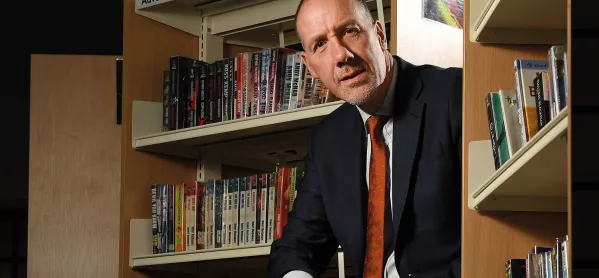
- Home
- As we arrive at half-term, 5 reasons to be cheerful
As we arrive at half-term, 5 reasons to be cheerful

As half-term break beckons for many (though not all) in education, here’s a reflection on what I’ve seen during my travels since those almost-forgotten sun-baked days of early September.
And - amid the autumn gloom - I see some cause for optimism. But let’s get the gloom out of the way first.
After all, without a doubt, there is much that is deeply depressing - issues that simply must be tackled if an education service of any quality is to survive. The most pressing of these is the impact of the school and college funding crisis, and I’ll be saying more about this next week in the run-up to the Budget on 29 October.
Aside from the issue of funding, teacher recruitment and retention continues to be a massive concern. And so too does the impact on the mental health and wellbeing of young people, and on teachers and leaders for that matter, of a system in which far too much emphasis is placed on tests and exams.
But, despite these problems, there are also causes for optimism, and as it is always a good idea to finish a half-term on a high, here’s five of them:
Headteachers marching together
First, the march on 28 September in London by 2,000 headteachers over the school funding crisis showed what we can achieve when we stand together. It made an impact beyond the Westminster and education sector bubble, with the public seeing on their television screens the unprecedented sight of around 10 per cent of the country’s heads making a powerful statement in the politest manner possible. Great credit to the grassroots Worth Less? campaign led by West Sussex headteacher Jules White for organising this extraordinary event.
The DfE funding mantra exposed
Second, as a result of the Department for Education’s tin-eared response to the headteachers’ march, there was that moment when the demeaning rhetoric of its mantra about “more money is being spent on education than ever before” was exposed for what it was, bringing the UK Statistics Authority into the ring, and demonstrating once-and-for-all that the funding crisis is real and unarguable.
Broadening the curriculum
Third, from the hundreds of school and college leaders I’ve talked to, there’s a growing feeling that we have to reclaim education from its narrow trajectory. This has surfaced in growing coalitions of cultural and education organisations, business leaders and academics, saying that the loss of creative subjects in our schools, the marginalisation of arts subjects that should be a birthright, cannot continue. When the Prince of Wales calls a national summit to air those concerns, you know there’s a change of mood.
The end of exam factories?
Fourth, I see increasing frustration about the narrow emphasis on cliff-edge performance measures and inspections that too often merely mirror a school’s performance data. That’s why I’m struck by the level of support for Ofsted’s proposals to move the emphasis of inspection away from data and more towards the quality of education, with the curriculum at its heart. This has the potential to be a liberating force for schools and teachers, and while we will be scrutinising the detail of the proposals very carefully when they are published, we are encouraged by the direction of travel.
Children are more than just grades
Fifth, I’ve been overwhelmed by the positive response to ASCL’s commission of inquiry that Roy Blatchford will lead into the “forgotten third” - the 190,000 pupils who at GCSE fail to gain Grade 4 or higher in English and maths. This is a terrible indictment of an education system predicated on judging its overall success by the number of young people who, after 12 years of teaching, are branded as failing. As one Year 12 student says: “I am a better person than these grades show.”
And finally, a personal observation. For me, this has been another week on the road - starting (on Monday) in Suffolk, heading to London, then Taunton, then Belfast, and (today) back to London.
If the downside of quite so much travelling is waking bleary-eyed in the early hours of each day, fumbling for an evasive light-switch and thinking “where on earth am I?”, then the privilege of the role is that I get to see many people in many places doing good work on behalf of the nation’s young people.
That is the reality of our schools and colleges. It’s that day-in, day-out dedication to the graft and craft of education, the activities which go on away from headlines and political hoo-ha, the sympathetic engagement by adults with young people making so much difference both to their lives and our lives, and the joy and fulfilment that, at its best, teaching can bring.
I noticed all this when I was myself still a teacher and a head. But now, in visits and conversations, in what I see and what I hear, I note our strengths and achievements and collective ambition far more than I used to. And I notice how little they get celebrated. Enjoy a well-earned break when it arrives.
Geoff Barton is general secretary of the Association of School and College Leaders
Register with Tes and you can read five free articles every month, plus you'll have access to our range of award-winning newsletters.
Keep reading for just £4.90 per month
You've reached your limit of free articles this month. Subscribe for £4.90 per month for three months and get:
- Unlimited access to all Tes magazine content
- Exclusive subscriber-only stories
- Award-winning email newsletters
You've reached your limit of free articles this month. Subscribe for £4.90 per month for three months and get:
- Unlimited access to all Tes magazine content
- Exclusive subscriber-only stories
- Award-winning email newsletters



